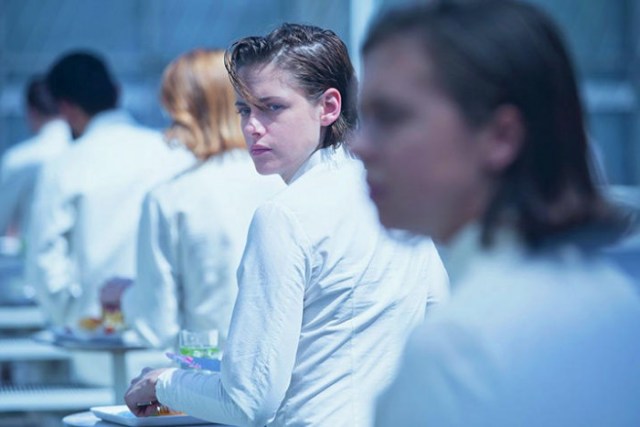Drake Doremus likes a love story. In Like Crazy we had lovers kept apart due to visa problems. In his dystopian futuristic thriller Equals, competing here in Venice, the lovers are divided by the state, but for entirely different reasons.
Our star-crossed lovers are Nia (Kristen Stewart) and Silas (Nicholas Hoult), living in a sterile future in which everyone dresses in pristine whites, and emotions (and stubborn stains, apparently) have been eradicated. The eponymous Equals are healthy, stable and interchangeable in their dullness, apart from the odd few who suffer from SOS (switched-on-syndrome), which indicates they are feeling emotion and need treatment. Depending on what stage you’re at, the options are taking tablets on a regular basis or topping yourself, a radical treatment that is actively encouraged.

When Silas starts noticing emotions in others he becomes aware of his own feelings. Working alongside Nia, a ‘hider’ who struggles to conceal her affliction, they fall in love. Their first taste of intimacy (in the office toilet) is one of the best scenes of the film: these two beautiful young people touching and reacting to touch makes for compelling viewing.
Alas for the rest of the film, this is one of the few positives. In this benignly totalitarian future, everyone is microchipped and scanned, warnings are repeated about physical contact and relationships, yet there is scant security. Nia and Silas run risks, but no more than your average Ashley Madison client. When we finally enter the dreaded DEN, the treatment centre for sick, here too the security is lax. The SOS sufferers are seen as aberrant, but in reality there are hordes of them.


Silas even manages sessions with a sort of SOS self-help group run by Jonas (Guy Pearce) with regular attenders including Bess (Jacki Weaver), who’s a doctor at DEN and is the queen hider. We get to hear of how the planet has reached this state and are told that there are other humans, base and running wild with emotion, but we never see them. More importantly we never understand why emotions are deemed so damaging. Anger and love don’t generate war, so why the big fear of it? Who knows? And, after 101 minutes of this, who cares?
The score clangs its way through the film as everyone mutters and whispers their lines of dodgy dialogue. Although we have ventured into the future, there is little that is adventurous or futuristic about the cinematography. As for the storyline, there is a giant nod to Romeo and Juliet: doesn’t anyone read plays in this distant future? Blimey, if you want to feign someone’s death then make sure everyone in the gang is on it. And what’s with the names? Nia, Silas, Jonas, Zoe, Gilead…one of the characters states: “We have cured the common cold and cancer” – it would appear they have eradicated normal names, too.
Stewart and Hoult are sympathetic leads. Their mutual joy of each other and their childlike and amazed approach to love are well wrought. Guy Pearce even gets a rare opportunity to show his softer side, while Toby Huss as office manager George is certainly not the worst boss you could ask for. But none of this matters. In this world, not all films are equal.








